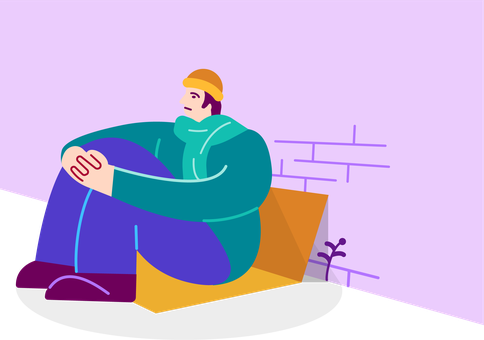It’s been a year since the Government asked councils to bring the people sleeping rough in their communities in to emergency accommodation to protect them from Covid-19. The efforts, which saw councils work with homelessness charities and public health agencies, were very successful. Together, we supported 37,000 people - with over 26,000 already moving in to longer-term housing - and saved hundreds of lives.
Over this period, people sent more alerts to StreetLink than in the previous 12 months, and our team worked hard to ensure that we were connecting those sleeping rough with the local services providing the emergency response and other available support.
However, while the annual rough sleeping statistics revealed a fall in the number of people sleeping on the streets in this country last year, the overall figure is still high and is up 52% from that of a decade ago. Despite progress being made through ongoing local investment and the emergency Covid-19 initiatives, economic pressures enhanced by the pandemic have continued to push more people to the brink of losing their homes throughout this public health crisis.
The experiences of the StreetLink phone line team who are responsible for taking your calls about the people you see sleeping rough, backs this up. We have particularly witnessed a rise in calls from individuals sleeping rough who are seeking support. These conversations are typically tough, but we do our best to provide helpful information, suggesting other services that can help and submitting the alert that will be a step towards moving people off the streets.
Working together to offer support
As ever, the work to help people to end their rough sleeping continues. Homelessness charities have adapted and innovated their services during the pandemic, working closely with health and social care teams to provide the support that people experiencing homelessness need. From providing emergency food and hygiene supplies, wellbeing packs, helping people be digitally connected, through to supporting people into longer term accommodation, they continue to look for new ways to collaborate to improve support.
Over the longer term new government funding to support people to move-on from emergency accommodation will provide 6,000 new homes over the next four years, offering quality, longer-term housing and specialist staff who will support people to access the help they need and fulfil their goals.
Also good news is that people experiencing homelessness are now in the priority group to receive the vaccine alongside everyone else aged 16-65 with underlying health conditions.
At StreetLink we are looking at ways to streamline and improve the service we offer to make sure we support and complement the range of services tackling rough sleeping. Later in the year, when we are able to be based more routinely in our offices again, we will be looking for new London-based volunteers to help us answer the phones and manage alerts to direct the outreach teams to where they are needed. Watch out for more details on our Twitter account and in future newsletters.
Looking at the bigger picture, homelessness services are calling on the Government for an approach that will tackle homelessness in all its forms and an updated strategy to end rough sleeping for good. This will involve preventing people from losing their homes in the first place by addressing the root causes of homelessness such as poverty, welfare support, housing supply.
How you can help
From sending a StreetLink alert or contacting local services, to volunteering for a local charity or writing to your MP, there are lots of ways that you can help people who are homeless or sleeping rough and we’d love you to get involved!
Homeless Link - the membership charity for homelessness services, which helps run StreetLink – has just produced a new toolkit with information, tips and resources to help you do just that. Check out the tool kit here.
Together we can help end homelessness.
